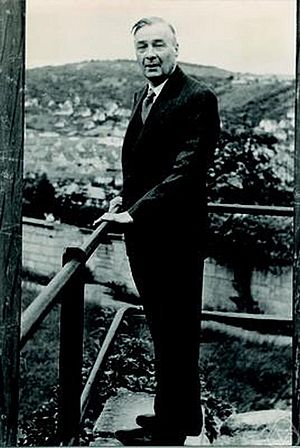Philip Hall facts for kids
Quick facts for kids
Philip Hall
|
|
|---|---|

Philip Hall
|
|
| Born | 11 April 1904 London, England
|
| Died | 30 December 1982 (aged 78) Cambridge, England
|
| Alma mater | University of Cambridge |
| Known for | Hall's marriage theorem Hall polynomial Hall subgroup Hall–Littlewood polynomial |
| Awards | Senior Berwick Prize (1958) Sylvester Medal (1961) Larmor Prize (1965) De Morgan Medal (1965) Fellow of the Royal Society |
| Scientific career | |
| Fields | Mathematician |
| Institutions | University of Cambridge |
| Academic advisors | Karl Pearson |
| Doctoral students | Paul Cohn James Green Brian Hartley Bernhard Neumann Derek Taunt Karl W. Gruenberg |
| Other notable students | Garrett Birkhoff Alfred Goldie |
| Influences | Karl Pearson William Burnside |
Philip Hall was an important English mathematician who lived from 1904 to 1982. He became a Fellow of the Royal Society (FRS), which is a big honor for scientists in the UK. His main work was in a field of math called group theory, especially focusing on finite groups and solvable groups. These are special ways to study how numbers or objects can be combined.
Contents
Who Was Philip Hall?
Philip Hall was born in London, England, on April 11, 1904. He was a very smart student from a young age. He loved mathematics and spent his life studying and teaching it.
His Early Life and Education
Philip Hall first went to a school called Christ's Hospital. There, he showed great talent in math and even won a special award called the Thompson Gold Medal for his skills. After that, he continued his studies at King's College, Cambridge, which is a famous university.
Awards and Achievements
Philip Hall was recognized for his amazing work in mathematics.
- In 1951, he was chosen to be a Fellow of the Royal Society. This is a very high honor for scientists in the United Kingdom.
- He received the Sylvester Medal in 1961, another important award for mathematicians.
- From 1955 to 1957, he was the President of the London Mathematical Society. This group helps mathematicians share their ideas and research.
- He also won the Berwick Prize in 1958 and the De Morgan Medal in 1965. These awards show how much his work was valued by other mathematicians.
What Is Group Theory?
Philip Hall's main work was in group theory. This part of mathematics studies "groups," which are sets of things (like numbers or shapes) that can be combined in a certain way. Think of it like a puzzle where you have rules for how pieces fit together.
- A "group" has rules like:
- You can combine any two things in the group and get another thing that's also in the group.
- There's a special "identity" thing that doesn't change anything when combined.
- For every thing, there's an "opposite" that can undo its effect.
- Philip Hall was especially interested in "finite groups" (groups with a limited number of things) and "solvable groups" (a specific type of group that can be broken down into simpler parts).
Why Is Group Theory Important?
Group theory might sound complicated, but it's used in many areas, not just math!
- Science: It helps scientists understand the structure of crystals, atoms, and molecules.
- Computer Science: It's used in cryptography (making codes secure) and in designing computer algorithms.
- Puzzles: Even popular puzzles like the Rubik's Cube can be understood using group theory!
Philip Hall's work helped mathematicians better understand these important structures. His ideas are still used today by students and researchers around the world.

